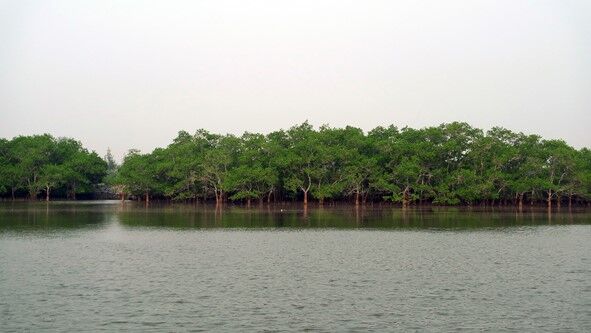A Novel Perspective on Mangroves' Past and Future was Published by Prof. Shi Suhua's Group
Source: School of Life Sciences
Written by: School of Life Sciences
Edited by: Wang Dongmei
The research group led by Prof. Shi Suhua in the School of Life Sciences at Sun Yat-sen University recently published their latest results, “Extremely low genetic diversity across mangrove taxa reflects past sea level changes and hints at poor future responses”, in Global Change Biology, which is the top journal in conservation biology. In this study, they integrated the data of genomic sequences and ecological surveys, and revealed that mangrove plants lost much of their genetic diversities though survived in the sea level changes in the past hundreds of thousand years. The levels of genetic diversities of present mangroves are significantly negatively correlated with their mortalities during climate change, thus the mangrove ecosystem is severely threatened by the projected sea level rise.
The sea level rises rapidly during the globe warming. The reports of IPCC (Intergovernmental Panel on Climate Change) estimated that global sea level will rise as much as one meter in the 21th century. Mangroves anchoring the tropical and subtropical coasts would bear the brunt. Being the wetland ecosystem locating between land and sea, mangrove forests have very important services in ameliorating the impact of flooding, promoting sediments, supporting coastal food webs, and sequestering carbon. Furthermore, low areas along tropical and subtropical coastlines are important regions for human population, the sheltering by mangrove forests directly relates with people’s livelihoods. Therefore, the conservation of mangroves is concerned by not only the scientific community but also the public. In 2007, Norman Duke from James Cook University of Australia and his colleagues warned on Science, that people may have to live in a world without mangroves by the end of this century. In April of this year, President Xi Jinping made an important instruction that “to better safeguard the marine wetland ecosystem with biodiversity” when he inspected Guangxi Beihai mangrove reserve.

A view of mangrove forests in Qinglan Harbor, Hainan
Thanks to the ability of vertical accretion of sediments and migration with coast fluctuation, mangroves which seems vibrant today successfully survived the historical sea level changes. However, optimisms for their future based on these facts are premature. The researchers collected 26 populations of six mangrove species in the Indo-Malayan region, and revealed extremely low genetic diversity in both local populations and large-scale regions by the next generation sequencing. Basing on the whole genome sequence of three mangrove species and Pairwise Sequentially Markovian Coalescent (PSMC) analysis, the researchers found that the effective population sizes of mangroves were reduced largely companying with the rapid drop of sea level during the past hundreds of thousand years, and were still at a very low level nowadays. Meanwhile, the research group, cooperating with Prof. Wang Wenqing from Xiamen University and Mr. Zhong Cairong from Hainan Dongzhai Harbor National Nature Reserve, performed a detailed ecological survey into the mangrove dieback event that occurred several years ago at Yalong Bay, Hainan. They counted the surviving conditions of mangrove trees as well as benthic animals. Integrating the data from genetic diversities and ecological survey, they found the mortality rates among species are heterogeneous, and significantly correlated with the levels of genetic diversities.
This study indicates that present mangroves with extremely low genetic diversity have narrow evolutionary space, and the extensive coastal constructions again hindered their retreat to inland regions, thus mangroves are severely threatened. To better conservation of mangroves, the authors proposed that buffer zones between mangrove forests and nearby developed lands must be abundant when designing mangrove reserves.
This research was funded by the key project of the National Natural Science Foundation of China and the National Key Research and Development Plan. Prof. Shi Suhua is the corresponding author. Doctoral candidate Guo Zixiao, postdoctoral fellow Li Xinnian and research fellow He Ziwen are co-first authors. The group led by Prof. Shi Suhua has long been researching into the adaptive evolution of mangroves and ecological genomics. The group published a series of papers within the recent two years in recognized journals including Molecular Biology and Evolution, National Science Review, Global Change Biology, New Phytologist and Molecular Ecology.
Link to the paper: http://onlinelibrary.wiley.com/doi/10.1111/gcb.13968/full
